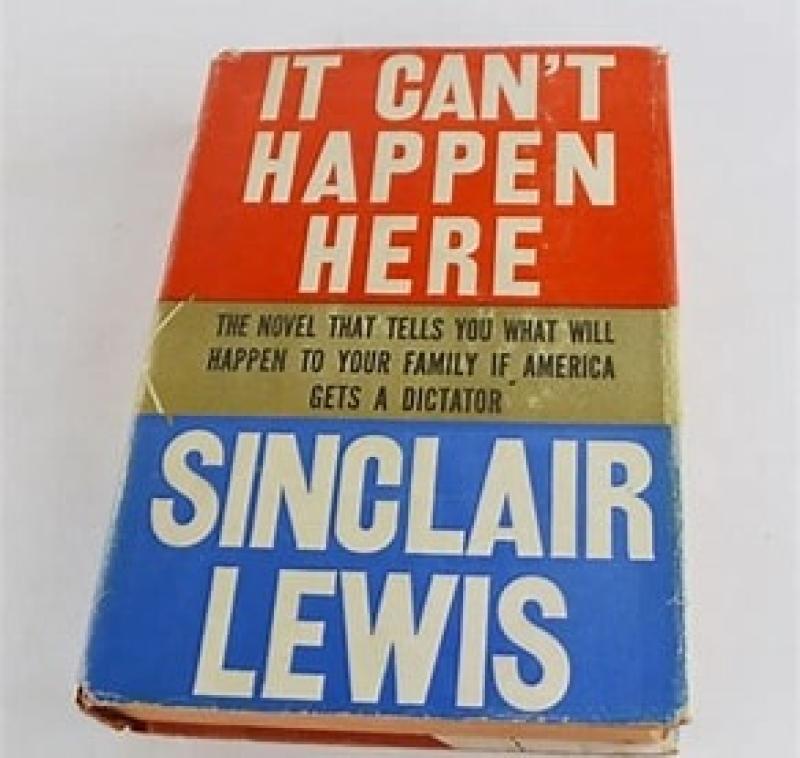Tyrants & Demagogues in Fiction: A Reading List
By: Carrie Mullins - Electric Literature

Tyrants & Demagogues in Fiction: A Reading List

It Can't Happen Here is a novel about Berzelius "Buzz" Windrip, a populist US senator who wins the presidency by playing on the fears of disgruntled white men and promising to return the country to "traditional American values." Sinclair Lewis wrote the book in 1935 as a semi-satirical response to the rise of Fascism in Europe. A few years ago the book would have seemed just that, a satire, maybe even a little overkill. Because in America we elect candidates, not cartoons. Right?
Enter one floppy-haired candidate in a crazy primary season, and "Buzz" Windrip has an uncomfortable ring of truth. It almost makes you long for the old days, when cruel leaders were straight-up tyrants. By "the old days" I'm talking about the world of kings, pharaohs, sultans; guys with long bloodlines and fancy crowns. These villains, the Joffrey Baratheons, the Coriolanus Snows, give stories an epic feeling, they start quests of good versus evil.
But having gone down the loud, confusing rabbit hole of political media coverage of late, I'd argue that fictional tyrants are a useful way to think about the current political climate. A novel can examine the workings of demagogues who wheedle their way into people's hearts by playing on prejudices and delivering overblown promises; think of Willie Stark in Robert Penn Warren's All the Kings's Men or Napoleon in Orwell's Animal Farm. Even the path of Lord Voldemort in the Harry Potter books contains an important message about the people who support crazy leaders on their path to power.
Here then are ten tyrants in literature, for times when you need a break from the pundits or you simply want to root against a jerk.
1. Willie Stark in All the Kings's Men by Robert Penn Warren
Robert Penn Warren based his fictional governor, Willie Stark, off real-life politician and demagogue of 1930s Louisiana, Governor Huey Long. Like Long, Stark builds his career through a cocktail of populist promises and personal indiscretions. In Stark's case, that means making big talk about taxing the rich while bullying and blackmailing his fellow politicians. Stark's belief is that the world is inherently bad so you have to "make goodness out of the badness," a catchy phrase until you realize that electing a person who believes the ends justify the means is a slippery slope.
2. The Dictator in Autumn of the Patriarch by Gabrielle Garcia Marquez
Leave it to Marquez to employ a near-maddening format, specifically a long, dense prose poem (each chapter is one paragraph, sentences can go on for pages) to bring the reader into the lonely, paranoid mind of an archetypical dictator in the Caribbean. The shifting chronology and POVs combine with Marquez's trademark magical realism to impart the sense that reality is subjective-a useful feeling if you are a leader who wants to do what you want, when you want, without thinking of the people who will be affected.
3. Lord Voldemort in the Harry Potter novels by J.K. Rowling
Harry Potter's nemesis isn't just a scary, blood-thirsty wizard looking to rule the world (though he is that), he's also a cautionary tale about how tyrants gain power. Someone supported every crazy leader when they were first starting out, and Rowling implicates a number of people in Voldemort's rise. There are Hogwarts professors who allowed themselves to believe that young Voldemort's interest in the dark arts was just innocent curiosity and the politicians who won't call him out because they're worried about their popularity. Voldemort also taunts and bullies the good guys throughout the book; a childish but effective route, if current politics are anything to go by.
4. Rafael Trujillo in The Feast of the Goat by Mario Vargas Llosa
Rafael Trujillo was the dictator of the Dominican Republic from 1930 until his assassination in 1961. In The Feast of the Goat , Vargas Llosa has imagined the circumstances surrounding the assassination of a man who during his 31 years in power was known simply as El Jefe , or, the Boss. By focusing on this abrupt, bloody end to a tyrant's power, Vargas Llosa has invited the reader to examine the tipping point between the inviting stability of a powerful leader and the inevitable crumbling of a society that's been stripped of its civil liberties.
5. Joffrey Baratheon in the Game of Thrones series by George R. R. Martin
A populist, Joffrey Baratheon is not. Joffrey gets the job as king of Westeros through good old-fashioned bloodlines and quickly becomes the poster child for the dangers of over-indulging your offspring. Though Joffrey is an ineffective king who can wield a crossbow in the bedroom but not the battlefield, there is something almost refreshing about his character. In today's world of greyscale villains (see: Darth Vader, Draco Malfoy, Magneto) it's fun to root against someone who's so reliably evil.
6. Hitler in Look Who's Back by Timur Vermes
What if Adolf Hitler was alive in 2011? That's the premise of this contemporary German novel which imagines a scenario in which Hilter wakes up in a vacant lot in Berlin, unaware of life after 1945. People think that this recently woke (but still not #woke) Hitler is some comedian or method actor, and soon Hitler's crazy racist rants land him a mass following on YouTube. Unfortunately, internet fame is just a step away from political power.
7. Mohammed Ben-Abbes in Submission by Michel Houellebecq
This satirical and often controversial novel also posits a what-if scenario, but in this case the place is France in the year 2022 and the charismatic politician is a man named Mohammed Ben-Abbes. Ben-Abbes sweeps to power with his party, the Muslim Brotherhood, and enacts reforms across France such as privatizing the Sorbonne so that it employs only Muslims and allowing men to take multiple wives. Ben-Abbes is used as the face of a much larger movement, his power felt even though he's only spoken of and never actually seen.
8. Berzelius "Buzz" Windrip in It Can't Happen Here by Sinclair Lewis
It Can't Happen Here tells the story of Berzelius "Buzz" Windrip, a populist politician who gets himself elected president and then proceeds to use his base of support- i.e. poor, resentful white men- to rule the country as a dictator. The novel was originally penned as a response to the rise of fascism in Europe, though Buzz's tactics seem to have stood the test of time: he uses dumbed down language to appeal to uneducated voters, employs a militia of self-armed crazies called the The Minute Men to suppress protesters, and promises that he'll make America great again.
9. President Coriolanus Snow in The Hunger Games by Suzanne Collins
As far as paranoid, vengeful dictators go, President Coriolanus Snow of Panem is towards the top. Snow murders people if he feels they've made him or the government look foolish. He poisons allies, fearing that they might one day become enemies. A good representation of how the most tyrannical people can also be the most insecure.
10. Napoleon in Animal Farm by George Orwell
In a letter to his translator, Orwell described 1984 as satirical tale "against Stalin," so there is no question who the tyrannical leader of the Farm, Napoleon, is modeled after. A pig in more than one way, Napoleon takes credit for projects he didn't enact, scapegoats innocent animals, and eventually goes on a purge, killing his dissenters. Orwell's classic makes a strong case for satire, as any high school student can tell you, those pigs will send a shiver down your spine.
Originally published at electricliterature.com on March 21, 2016.
The Code of Conduct and Terms of Service must be complied with.
Any comment posted about politics or religion not relevant to the seeds/articles that are posted will be deleted.
The administrator reserves the right to delete any comment he considers to be offensive, off topic or of no value.
Videos or images or links to sources that the Administrator cannot open must be described or explained when requested or they will be deleted.





Another in my series of topical seeds/articles. Frist of all I want to make it perfectly clear that I am NOT "Berzelius "Buzz" Windrip", However, the novel It Can't Happen Here, written by Sinclair Lewis about 90 years ago, seems to be described as being kind of predictive of present times, and the author of this seed said " The novel was originally penned as a response to the rise of fascism in Europe, though Buzz's tactics seem to have stood the test of time: he uses dumbed down language to appeal to uneducated voters, employs a militia of self-armed crazies called the The Minute Men to suppress protesters, and promises that he'll make America great again." It might be interesting to compare what will be happening in America over the next 4 years to what happened in the novel It Can't Happen Here, because it could.
If anyone is curious about where the expression "Make America Great Again" they can open this article:
Who Was the First Politician to Use "Make America Great Again" Anyway?
LINK -> Did Donald Trump Steal Make America Great Again? - Make America Great Again Campaign Slogan Origins
More than half a century ago I drove with some friends from Toronto to Detroit to see Frank Zappa and the Mothers of Invention perform live at the Rock Pile auditorium, and the only thing I remember other than the magnificent light show was his performance of "It Can't Happen Here".
I was very impressed by Animal Farm (i read it over and over again--- I read it several times!)
Me too. It was a natural progression from my childhood love of the Walter Brooks 'Freddy the Pig' books which were about a community of talking animals on a farm.
Same here. It was required reading in high school.
I don't remember if it was required reading, but I was devouring Sci-Fi and fantasy when I was a pre-teen and teen.